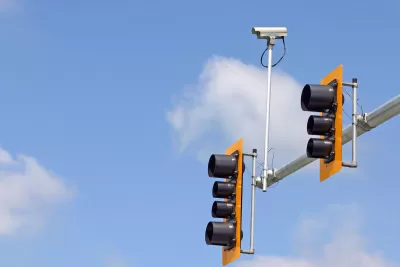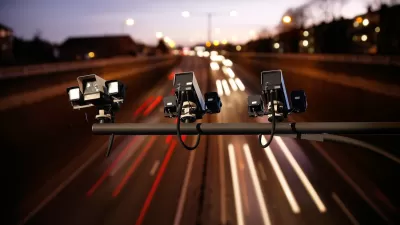Residents are wary of the new technology’s potential for surveillance, but support boosting enforcement while reducing interaction with police.

A new report outlines the opinions expressed by Boston community members in a series of focus groups that sought to understand how Black residents view the city’s road safety and traffic enforcement policies. Writing in Streetsblog Massachusetts, Christian MilNeil outlines the report’s findings.
Researcher Lindiwe Rennert, the study’s author, “found widespread agreement that the current system is not working well, particularly in Black communities, which face higher crash risks both from police violence and from dangerous roads.” But residents also expressed concern over violent interactions with law enforcement.
“The big takeaway was, cameras don’t have guns.” According to Rennert, “While there are civil liberties concerns associated with camera-based enforcement, the concern is de-escalated from loss of life, to an abuse of information. Both are important, but the scale is unquestionably different.” But participants also said new technology could set up new methods of surveillance and perpetuate discriminatory systems.
Based on the focus groups, Rennert makes some suggestions to lawmakers to implement successful automated enforcement programs: ensure fine revenues are directed to street safety and public transit, establish external oversight, limit how much cameras can see, use trusted agencies, and “right-size the penalty” to prevent outsized punishment for minor infractions.
FULL STORY: ‘Cameras Don’t Have Guns’ – Boston’s Black Community Weighs In On Camera-Based Traffic Enforcement

Maui's Vacation Rental Debate Turns Ugly
Verbal attacks, misinformation campaigns and fistfights plague a high-stakes debate to convert thousands of vacation rentals into long-term housing.

Planetizen Federal Action Tracker
A weekly monitor of how Trump’s orders and actions are impacting planners and planning in America.

In Urban Planning, AI Prompting Could be the New Design Thinking
Creativity has long been key to great urban design. What if we see AI as our new creative partner?

Pedestrian Deaths Drop, Remain Twice as High as in 2009
Fatalities declined by 4 percent in 2024, but the U.S. is still nowhere close to ‘Vision Zero.’

King County Supportive Housing Program Offers Hope for Unhoused Residents
The county is taking a ‘Housing First’ approach that prioritizes getting people into housing, then offering wraparound supportive services.

Researchers Use AI to Get Clearer Picture of US Housing
Analysts are using artificial intelligence to supercharge their research by allowing them to comb through data faster. Though these AI tools can be error prone, they save time and housing researchers are optimistic about the future.
Urban Design for Planners 1: Software Tools
This six-course series explores essential urban design concepts using open source software and equips planners with the tools they need to participate fully in the urban design process.
Planning for Universal Design
Learn the tools for implementing Universal Design in planning regulations.
planning NEXT
Appalachian Highlands Housing Partners
Mpact (founded as Rail~Volution)
City of Camden Redevelopment Agency
City of Astoria
City of Portland
City of Laramie





























